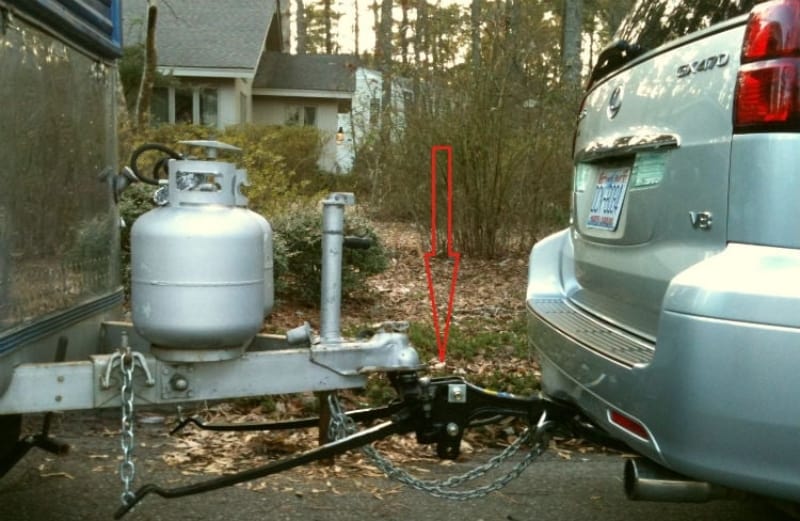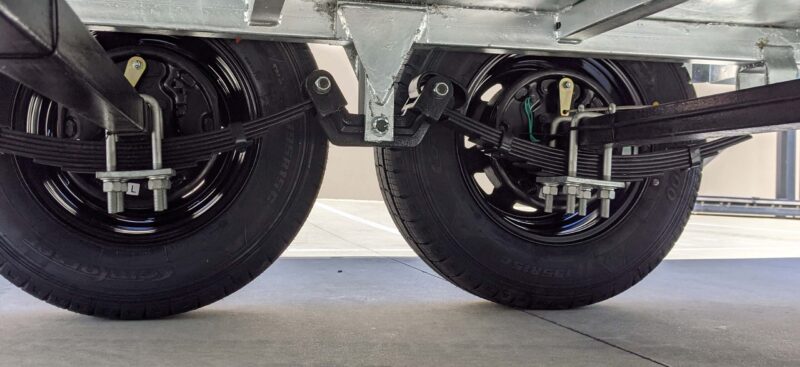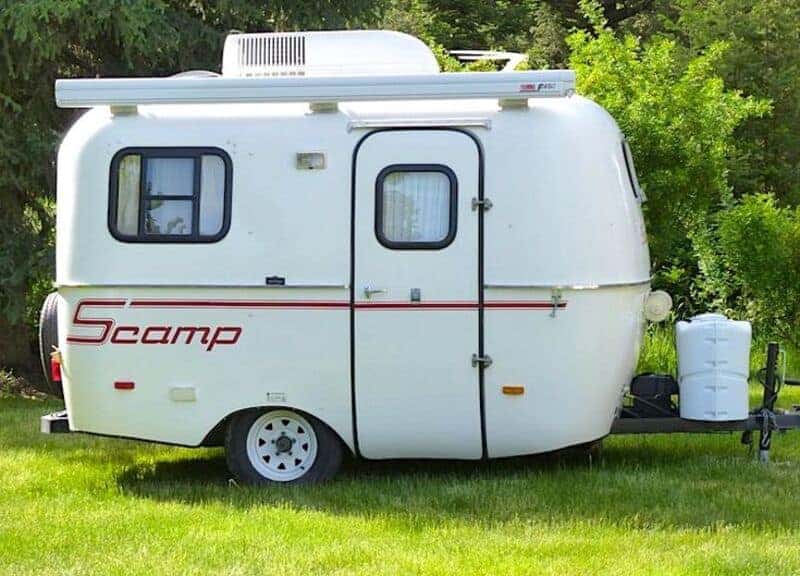If you’re thinking about purchasing an Alpha Wolf by Cherokee or a Classic Airstream and you’re rocking a Toyota Prius with a brand new after-market hitch, prepare to be frustrated. You’d have more success hitching the travel trailer to your back—and surviving tongue weight towing strain with your hands.
Correctly and safely towing a travel trailer is all about tongue weight. As it turns out, towing is much more mathematical than most of us would prefer. And we all thought 9th-grade math class was a waste of time.
Understanding your travel trailer’s tongue weight/hitch weight is necessary for your safety and the capabilities of your towing vehicle. If you’ve never towed anything, you’ll discover there is more to it than slapping a trailer on the back of the truck and heading down the road.
What is Tongue Weight?
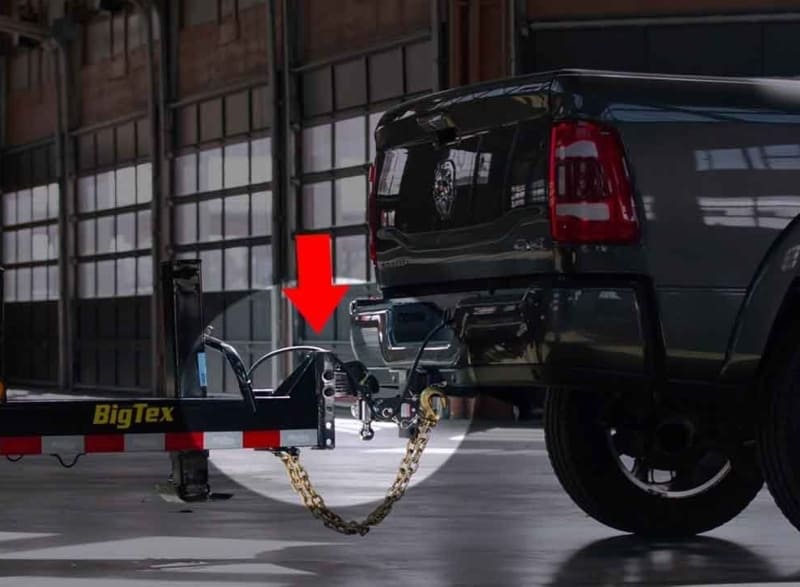
Tongue weight is defined as the weight, in terms of a downward force, exerted by the tongue of the trailer. There are upward forces to contend with as well, which is where weight distribution becomes so important.
The weight of the trailer and cargo carrying capacity (what you load on the trailer or the weight of a travel trailer plus cargo, a.k.a. CCC) play the largest role when calculating tongue weight.
Of course, the term “tongue weight” can be misleading since we’re dealing with standard ball and hitch setups, goosenecks, and fifth wheels (more on that below). In most cases, your tongue weight should be between 10% and 15% of your GTW (Gross Total Weight) for travel trailers. Fifth wheels and goosnecks should be around 20%.
Less than 10% is too low, and higher than 15% is too much. Then there is your “Tongue Weight Rating,” which should be 10% of the Tow Capacity Rating. Confused yet? Don’t worry; we will introduce plenty more acronyms and weight ratings.
Let’s say your trailer hitch is rated for 5,000 lbs. That means your Tongue Weight is 500 lbs, 10% of the trailer hitch rating. If you have a fifth wheel, your target Hitch Weight goal should be 1,000 lbs.
Does Hitch Weight and Tongue Weight Mean the Same Thing?
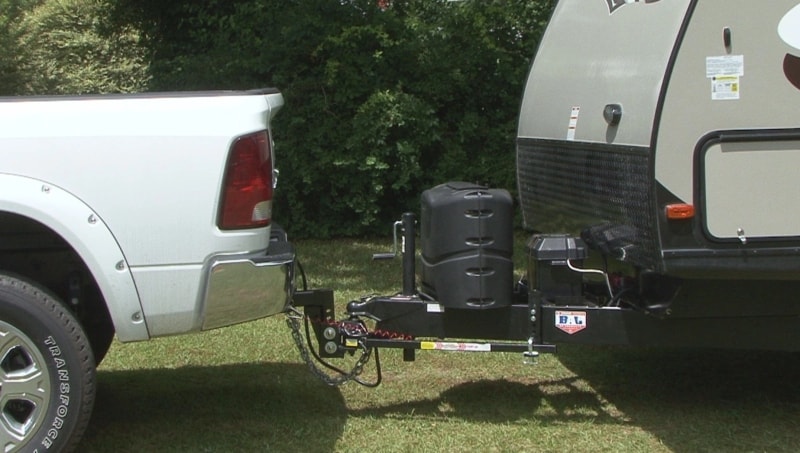
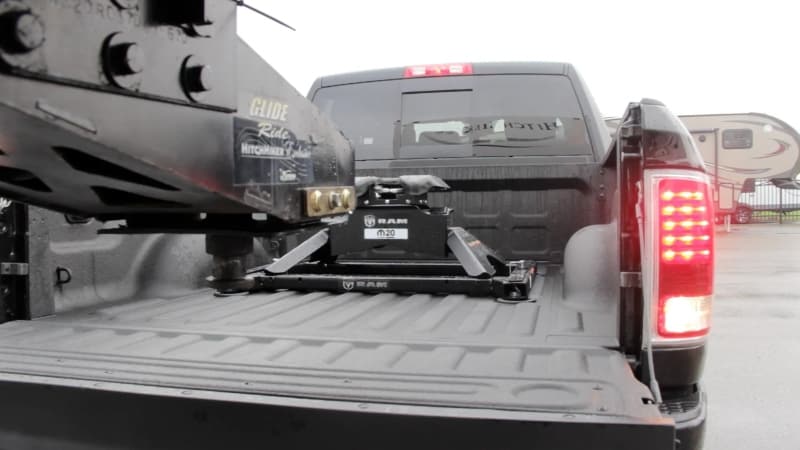
Not necessarily, though both terms are often used interchangeably, especially in casual conversations. For hauling travel trailers, tongue weight should always reference the standard ball and hitch.
Hitch weight should reference gooseneck and fifth-wheel towing. As confusing as all to the GVWR, GTW, tongue weight rating, weight distribution, tow capacity rating, and all the rest can be, there’s no reason to use the two terms interchangeably here.
When we refer to “hitch weight,” we’re talking about goosenecks and fifth wheels. Tongue weight is exclusively for the old ball and rear-mounted hitch under the bumper.
How Does Tongue Weight Affect Towing?
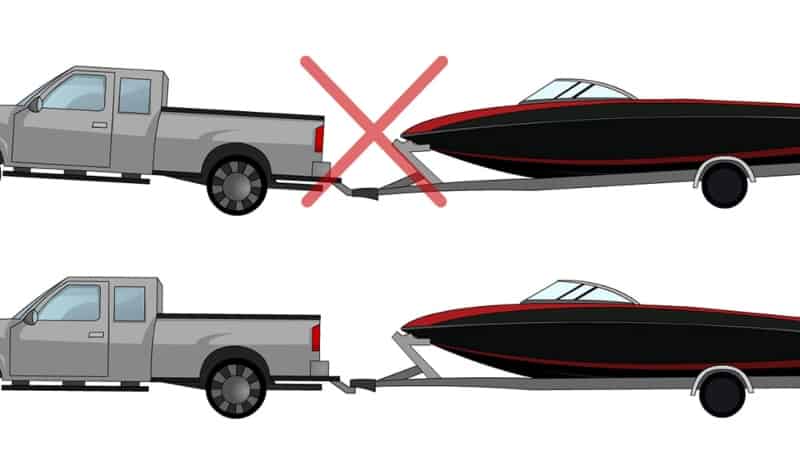
Tongue weight affects your towing capabilities to such a degree that it’s black and white. There’s no healthy, in-between option. You’re either safely towing a travel trailer, or you’re not. Weight distribution, in terms of the weight of the travel trailer, plus your additional cargo, is essential.
If the weight is too much, it will press your rear tires down, which could result in a blowout and extreme handling problems. If the weight is too little—especially if the weight distribution places too much weight in the rear of the travel trailer—you could get the triangle/pyramid effect.
This is where the trailer tongue rises up, along with the back of your vehicle, forming a sort-of triangle point where the tongue sits on the hitch. This does the opposite, exerting upward pressure and raising your rear tires. It creates a lot of “fish-tailing” side-to-side sway in the trailer and can be more dangerous than too much weight.
3 Methods To Know the Tongue Weight
Fortunately, there are a few ways you can accurately assess your tongue weight.
1. Use a Tongue Weight Scale
You can pick up a decent tongue weight scale from your local hardware store, Home Depot, Lowes, or Amazon. They aren’t too expensive and are probably the most accurate option. Simply set your scale up underneath the trailer jack.
Let the weight settle down for a second and take a reading.
2. Visit a Weigh Station
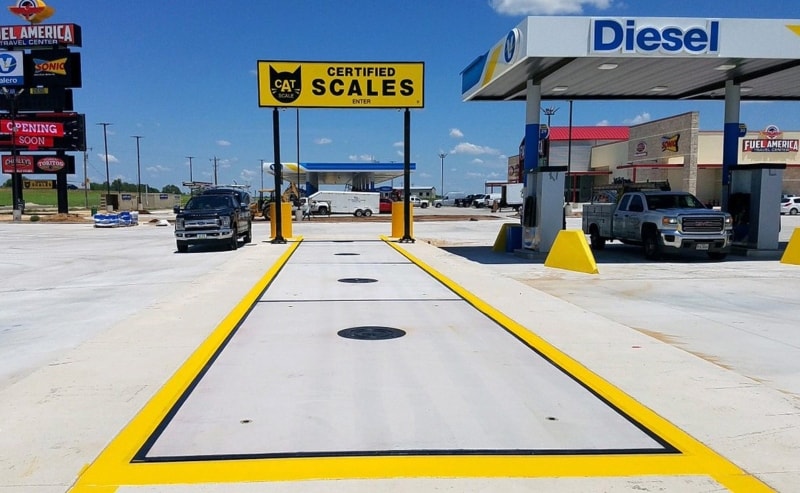
This is a more involved but accurate method, and you can do it at a weigh station, local CAT Scale, or the local dump. Weigh your vehicle first, without anything attached, and write the number down. Hitch up your travel trailer and roll back through. Weigh your vehicle again (without any of the travel trailer tires touching the scale).
When you’re done, take the number from your hitched travel trailer weight and subtract the weight of your vehicle alone. The result is your tongue weight.
3. Try Your Bathroom Scale
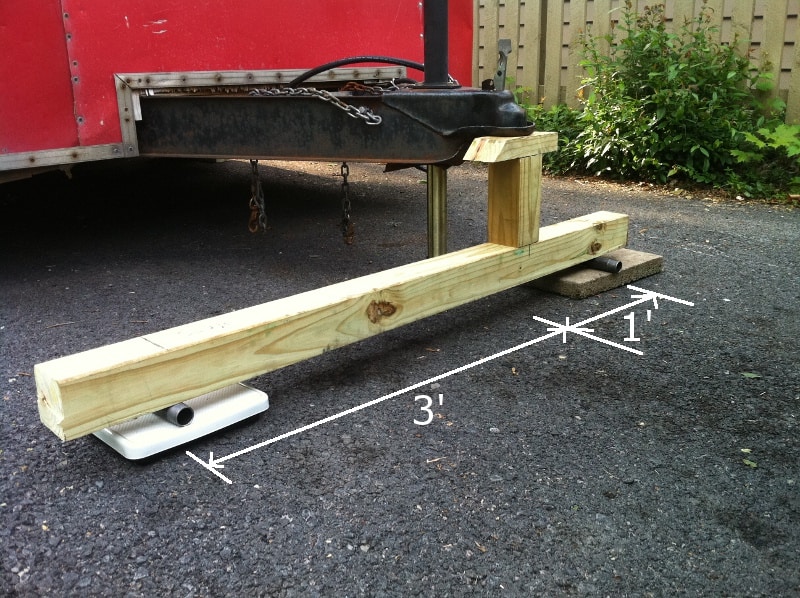
Most bathroom scales are designed to go as far as 500 lbs, so it’s an ideal measurement device for your tongue weight. Settle the jack stand down on top of the bathroom scale and take the reading. If you need more height, slide 2×10 boards underneath the scale.
Understanding the Proper Tongue Weight When Towing
Too little or too much creates unsafe conditions on the highway. If the downward force of the trailer tongue is 10% to 15% of your GTW, it will eliminate potentially unsafe conditions.
If you’re loading up a lot of cargo in all those nice storage spaces beneath, above, and within your travel trailer, it’s easy to get carried away, assuming the added weight is negligible.
Is Tongue Weight Included in the Trailer’s GVWR?
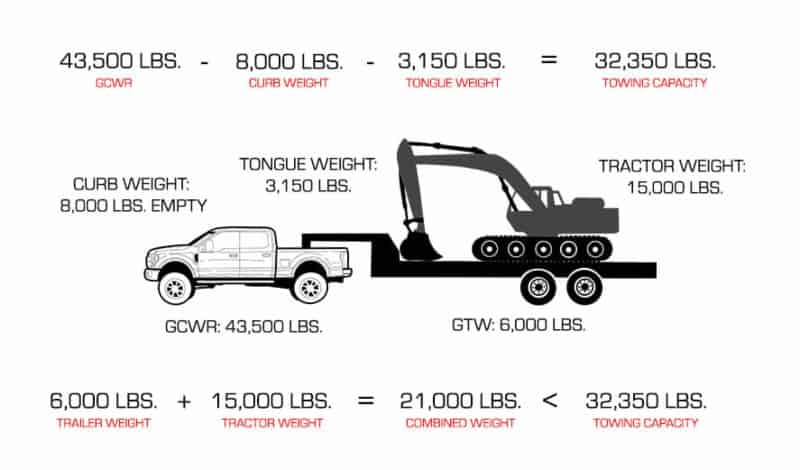
The tongue weight is not included in the trailer’s GVWR (Gross Vehicle Weight Rating). It is determined by the vehicle’s total weight with all your cargo and people inside. Since teardrop campers are so short, the Gross Axle Weight Rating (GAWR) is the GVWR.
Manufacturers include the weight of the travel trailer in the GVWR but, again, not the tongue weight. There are other factors to consider as well. Some travel trailers include certain provisions on the front of the trailer, such as propane tanks.
By law and regulation, these weight numbers are required to be easily located on the RV itself. You can find a sticker with these weights on the driver’s side of the hitch or other places your RV sales rep will identify.
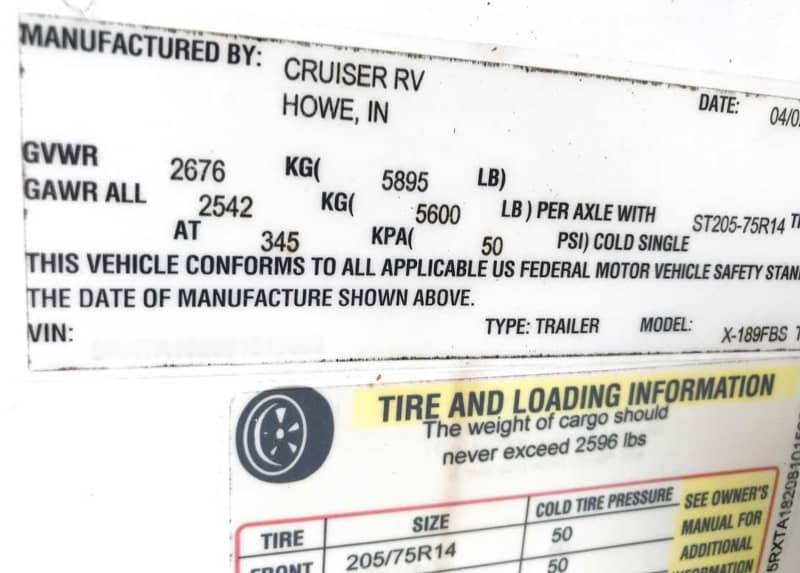
This is part of the randomness that excludes tongue weight from GVWR. All GVWR boils down to is how much the travel trailer can weigh when everything is loaded up on it. It doesn’t include tongue weight because GVWR is the total weight of the RV, not how much pressure it’s putting on your tow vehicle.
If your travel trailer is not loaded to capacity, your tongue weight might be lower. Weight distribution hitch systems change the number as well.
Does Tongue Weight Count Against Towing Capacity?
The terminology for a vehicle, travel trailer, hitches, and towing calculations is so extensive that it’s easy to get confused. Towing and payload capacity are two different things. The tongue weight is counted against payload capacity.
- Curb Weight is the unloaded vehicle weight (UVW or “dry weight”) of your travel trailer with water and other liquids in the holding tanks.
- Payload Capacity is primarily used for truck campers and fifth wheels. It concerns how much weight can safely be placed in the cargo bed of your pickup truck.
- GVWR – curb weight – tongue weight= Payload Capacity
- Your Tongue Weight Towing Capacity comes from subtracting curb weight from GCWR (Gross Combined Weight Rating)
- Total towing weight is determined by subtracting curb weight, cargo, and passenger weights from GCWR
Tongue weight is not counted against towing capacity but is counted against payload capacity.
What Happens if Tongue Weight is Too Heavy When Towing?
The downward force of the tongue compresses the back tires, which, in turn, lifts the front tires. This effect allows the travel trailer to push your vehicle around and reduces the vehicle’s braking and turning capabilities.
Learn more about lowering your tongue weight by checking out our article called How To Reduce Tongue Weight On A Travel Trailer.
What Can Happen if You Exceed Towing Capacity?
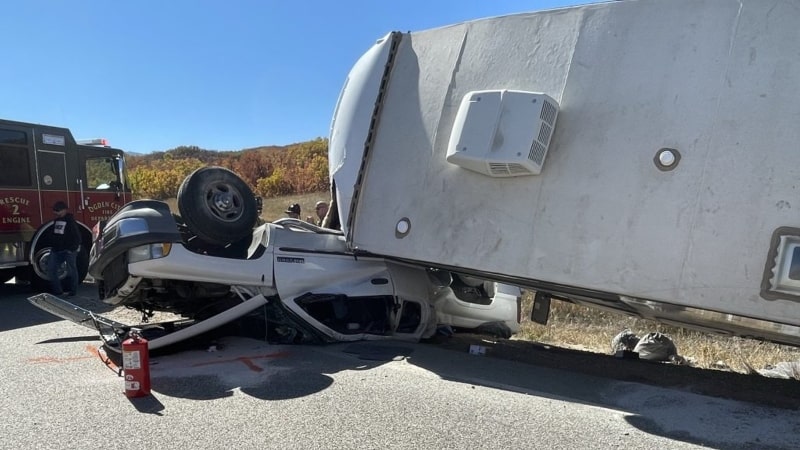
A lot can happen if you exceed your towing capacity. What would we do without temptation? It’s so tempting to tow something that’s only a few pounds over the towing capacity, especially if the destination is really close by. Why not? People still tow cars around with ropes, after all. What could be the harm?
For one, you will have a lot of trouble braking. Sometimes that fine line between over and underweight snaps like an overstretched rubber band. You may find you’re a sitting duck in the middle of an intersection because you couldn’t brake for the red light in time.
The excess weight may overcome your vehicle’s torque, dragging you back down the hill you just drove up, especially if you stop on a steep incline. That sounds fun (not). Exceeding your towing capacity will also wear down your vehicle faster, including your brakes, fluids, engine, shocks, and tires.
From an RV insurance point-of-view, you would be in breach of your coverage! One of the first things RV insurance adjusters look for are clues to determine if you are towing overweight. If so, depending on your insurance policy coverage details, they could deny your claim since you were towing unsafely.
Can Tongue Weight be too Light?
We discussed the triangle or pyramid effect above, and that’s what happens when your tongue weight is too light. It usually indicates that your weight distribution is off, and the tongue pulls up on the hitch. The same can happen in a fifth wheel or a gooseneck, though it may look less obvious.
How to Check Tongue Weight and Balance it Out
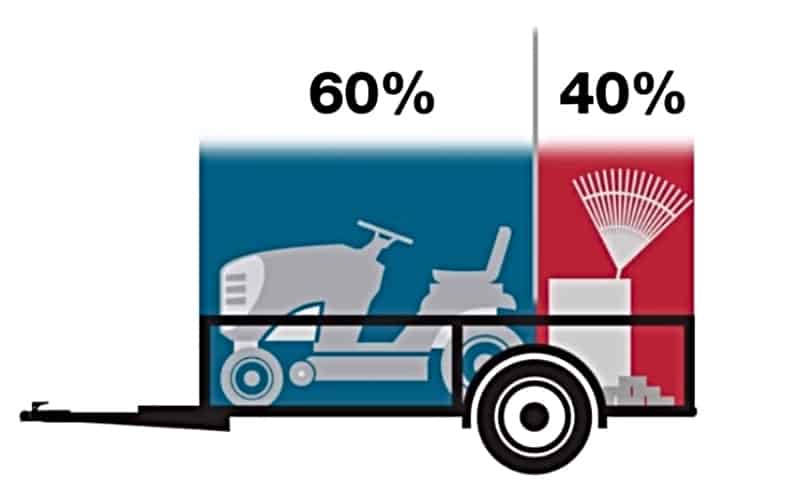
The best way to determine if you need to balance things out is to weigh your tongue when you have everything loaded up and ready to go.
Let’s say you’re tongue weight is 1,110lbs and your tongue weight rating is 10,000lbs. The first thing you should try before you start dumping things off is to shift some of the heavier storage items from front compartments to rear compartments, balancing the load out.
When you’re done, weigh it again. If you are below 1,000 lbs, enjoy your road trip. If not, you may have to leave some things at home.
Can I Increase My Tongue Weight for Towing?
You definitely can increase your tongue weight for towing. The best way to do this is to shift heavier equipment from rear compartments to front compartments. It’s all about weight distribution, and the more weight you bring forward, the more weight settles in the front, increasing your tongue weight.
The goal is always 10% to 15% of GTW (or 20% for fifth wheels and goosenecks) or your tow capacity rating.
Final Thoughts: Is Towing with the Wrong Tongue Weight Dangerous?
Towing with the wrong tongue weight can be dangerous. If you’re worried about your family vacation ending with your brand-new RV wrapped around an oak tree 150 yards off the highway, then, by all means, ignore the tongue weight. It’s absolutely dangerous, and that’s why manufacturers throw in all of these different weight numbers.
Take the time to determine your weight and distribute the necessary cargo appropriately. Your budget and bank account will thank you, and so will the oak tree.
About the Author:
Thomas Godwin is a full-time freelance writer with a BFA in Creative Writing, a U.S. Marine, and an avid outdoorsman.
When he’s not writing, he’s raising chickens and Appleyard ducks. Thomas also constructs teardrop campers (attempting to anyway) and kayaks the Blackwater River with his wife, two daughters, and his Dobermans.


